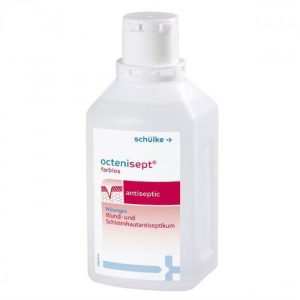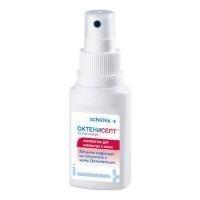Description
Latin name
DERMAZIN
release form
cream
Packaging
In a tube of 50 g cream. In the package 1 tube.
Pharmacological action
Dermazinum is an antimicrobial drug for external use, sulfonamide.
When applied to the surface of a burn, silver sulfadiazine disintegrates, slowly and continuously releasing silver and sulfanilamide ions, which inhibits the growth and reproduction of bacterial cells.
Dermazin has a wide spectrum of antibacterial activity, including:
– Virtually all types of microbes that cause infection of burns and other wounds on the surface of the skin, including: – Pseudomonas aeruginosa.
– Escherichia coli.
– Proteus spp.
– Staphylococcus spp.
– Streptococcus spp.
– Klebsiella spp.
– Enterobacter spp.
Sulfadiazine silver penetrates necrotic tissue and exudate.
Indications
– Treatment and prevention of burn infections (including before autodermoplasty).
– Treatment and prevention of infection of trophic ulcers, wounds.
Contraindications
– Children under 2 months of age.
– Premature newborn babies.
– Period of labor.
– Hypersensitivity to the drug.
– Hypersensitivity to sulfonamides.
Use during pregnancy and lactation
Dermazin should not be used during pregnancy, unless the potential benefit of preserving life exceeds the potential harm to the fetus. The use of sulfonamides increases the risk of developing hyperbilirubinemia, therefore, Dermazin should not be prescribed especially in the third trimester of pregnancy and during childbirth. The exception is cases where the potential benefit for saving the patient’s life exceeds the existing risk to the fetus.
It is not known whether silver sulfadiazine is excreted in human breast milk. However, other sulfonamides are found in milk. In addition, all sulfonamides increase the risk of hyperbilirubinemia. In connection with the possibility of developing serious side effects in an infant with the use of sulfonamides in a nursing mother, if it is necessary to use the drug during lactation, the issue of stopping breastfeeding should be decided, taking into account the degree of significance of the treatment for the mother.
Composition
1 g of cream for external use 1% contains:
– Active substances srdlazp C – 10 mg.
– Excipients Cetyl alcohol, hydrogenated peanut butter, polysorbate 60, propylene glycol, methyl hydroxybenzoate, propyl hydroxybenzoate, purified water.
Dosage and Administration
Dermazin may be used with or without dressings. The product is intended for use on the skin only.
After surgical treatment of the surface of the burn, the cream is applied to it with a layer 2-4 mm thick. The drug should be applied 1-2 times / day.
Treatment should be continued until the wound surface is completely healed.
The method of applying the cream is the same for the treatment of burns and trophic ulcers. Dressings should be changed daily.
Side effects
Local reactions in the form of a burning sensation and itching are occasionally possible.
There are some reports of the development of skin necrosis, erythema multiforme, skin pigmentation disorders, interstitial nephritis.
There have been isolated cases of passing leukopenia in patients treated with silver sulfadiazine. Leukopenia when using silver sulfadiazine is characterized mainly by a decrease in the number of neutrophils. The maximum decrease in the level of neutrophils is observed 2-4 days after the start of treatment. Then their level is normalized within 2-4 days, however, continued treatment with silver sulfadiazine does not affect the recovery of white blood cell count.
The degree of absorption of silver sulfadiazine depends on the size of the burn surface and the degree of tissue damage. In rare cases, any adverse reactions characteristic of sulfonamides can develop: hematopoiesis, including agranulocytosis, aplastic anemia, thrombocytopenia, and hemolytic anemia, skin allergic reactions, including Stevens-Jones syndrome and exfoliative dermatitis, dyspeptic disorders, hepatitis and hepatocellular central necrosis nervous system and toxic nephrosis.
Drug Interaction
Silver sulfadiazine can inactivate enzyme preparations to cleanse the wound when used simultaneously.
It is noted that the concomitant use of cimetidine increases the risk of leukopenia.
Overdose
Argyria due to increased systemic absorption of silver does not develop.
– Symptoms: with prolonged use on a large body surface, serum sulfadiazine concentrations may approach the level achieved with systemic use, which increases the risk of side effects characteristic of sulfanilamides.
– Treatment: symptomatic therapy, determination of serum sulfanilamide concentration, heavy drinking (it is recommended to maintain daily diuresis at the level of 1200-1500 ml and more).
Storage conditions
– The drug should be stored at a temperature not exceeding 25 ° C.
The Expiration of
is 3 years.
Deystvuyuschee substances
sulfadiazine silver
Dosage form
dosage form
cream
Sandoz, Switzerland



